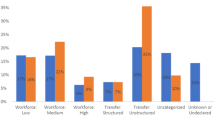Abstract
Race effects on track mobility are hypothesized on the basis of racial differences in initial track placement, learning opportunities, course preferences, and academic guidance. Race differences in patterns of track mobility are observed in a large, longitudinal survey that follows students from ninth through twelfth grade. Initial track placements and changes in track over the school year and between school years are described. Multivariate analyses associate race with the likelihood of changing track and the direction of the track change. Black students are less likely than white students to move to Honors and advanced tracks in Mathematics but more likely than whites to move from the Basic to the Regular track in English. Black students are considerably more likely than whites to drop out of the tracking system in English and Mathematics, except for black students in Advanced English and in Honors and Advanced Mathematics. The results of this study point to tracking as an organizational characteristic of schools that can provide students with unequal access to the curriculum and, therefore, to learning opportunities by race. Close monitoring of track changes is recommended to insure that tracking promotes the academic achievement of all students.
Similar content being viewed by others
References
Alexander, Karl, Cook, Martha & McDill, Edward (1978). Curriculum tracking and educational stratification.American Sociological Review, 43, 47–66.
Alexander, Karl & McDill, Edward (1976). Selection and allocation within schools: Some causes and consequences of curriculum placement.American Sociological Review, 41, 963–980.
Catsambis, Sophia (1994). The path to math: Gender and racial-ethnic differences in mathematics participation from middle to high school.Sociology of Education, 67, 199–215.
Cook, Martha & Alexander, Karl (1980).Causes and consequences of curriculum enrollment (Final report to National Institute of Education, Grant No. NIE-G-80-0113). Baltimore: Center for the Social Organization of Schools.
Darling-Hammond, Linda (1994). Performance-based assessment and educational equity.Harvard Educational Review, 64, 5–30.
Ekstrom, Ruth, Goertz, Margaret, Pollack, Judith, & Rock, Donald (1986). Who drops out of high school and why: Findings from a national study.Teachers College Record, 87, 356–373.
Gamoran, Adam & Berends, Mark (1987). The effects of stratification in secondary schools: Synthesis of survey and ethnographic research.Review of Educational Research, 57, 415–435.
Gamoran, Adam & Mare, Robert (1989). Secondary school tracking and educational inequality: Compensation, reinforcement, or neutrality?American Journal of Sociology, 94, 1146–1183.
Hallinan, Maureen (1991). School differences in tracking structures and track assignments.Journal of Research on Adolescence, 1(3), 251–275.
Hallinan, Maureen (1992). Organization of students for instruction in the middle school.Sociology of Education, 65, 114–127.
Hallinan, Maureen (1993).Track mobility in secondary schools. Unpublished manuscript, University of Notre Dame, Notre Dame, IN.
Hallinan, Maureen (1994). School differences in tracking effects on achievement.Social Forces, 72(3), 799–820.
Hallinan, Maureen T. & Sorensen, Aage B. (1986). Student characteristics and assignment to ability groups: Two conceptual formulations.Sociological Quarterly, 27(1), 1–13.
Hanson, S. L. (1994). Lost talent: Unrealized educational aspirations and expectations among U.S. youths.Sociology of Education, 67, 159–183.
Jones, James, Vanfossen, Beth, & Spade, Joan (1985).Curriculum placement: Individual and school effects using the High School and Beyond data. Paper presented at the annual meeting of the American Sociological Association, Washington, DC.
Oakes, Jeannie (1990). Opportunities, achievement and choice: Women and minority students in science and mathematics.Review of Research in Education (Vol. 16). Washington, DC: American Educational Research Association, pp. 153–222.
Pallas, Aaron, Entwistle, Doris, Alexander, Karl, & Stukla, M. Francis (1994). Ability-group effects: Instructional, social, or institutional?Sociology of Education, 67(1), 27–46.
Rosenbaum, James (1976).Making inequality: The hidden curriculum of high school tracking. New York: Wiley.
Rosenbaum, James (1980). Track misperceptions and frustrated college plans.Sociology of Education, 53, 74–88.
Sorensen, Aage (1970). Organizational differentiation of students and educational opportunity.Sociology of Education, 43, 355–376.
Sorensen, Aage & Hallinan, Maureen (1983). Race effects on assignment to ability groups. In Penelope Peterson, Louise Cherry Wilkinson, & Maureen Hallinan (Eds.),The social context of instruction: Group processes. San Diego: Academic Press, pp. 85–103.
Spady, William (1973). The impact of school resources on students. In Fred Kerlinger (Ed.),Review of research in education. Itasca, IL: F. E. Peacock Publishers, Inc., pp. 135–177.
Vanfossen, Beth, Jones, James, & Spade, Joan (1987). Curriculum tracking and status maintenance.Sociology of Education, 60, 104–122.
Author information
Authors and Affiliations
Corresponding author
Additional information
This research was funded by Grant #R117E10139-01 from the U.S. Department of Education, Office of Educational Research and Improvement and by National Science Foundation Grant No. RED-9311800. The author is grateful to these agencies for their support as well as to Warren Kubitschek for his contribution to the data analysis and to Ann Power for research assistance.
Rights and permissions
About this article
Cite this article
Hallinan, M.T. Race effects on students' track mobility in high school. Social Psychology of Education 1, 1–24 (1996). https://doi.org/10.1007/BF02333403
Received:
Accepted:
Issue Date:
DOI: https://doi.org/10.1007/BF02333403




